|
San
Diego Jewish World
|
||||||||||||
Susan Davis
to head Personnel Subcommittee WASHINGTON (Press Release) – Congresswoman Susan Davis (Democrat, California) was chosen on Thursday, June 14, to serve as Chair of the Personnel Subcommittee of the House Armed Services Committee. She will be the first San Diegan to chair the subcommittee.
“I am
honored to be selected by my colleagues for this important position,” said
Davis. “I look forward to addressing the critical needs of our servicemembers
and their families. As someone who represents many military families, I have made their quality of life issues one of my top priorities.” “I am pleased to announce that the House Armed Services Committee Democrats have elected two very able and dedicated members to lead subcommittees,”said Rep. Ike Skelton (D-MO), Chairman of the House Armed Services Committee. “Both Congressman Snyder and Congresswoman Davis bring a great deal of experience and expertise to their new roles and I am confident they will make us proud as we work to support our men and women in uniform.” A leading advocate for military families in San Diego and around the world, Davis intends to conduct thoughtful hearings which will focus on the needs of our servicemen and women and their families. Mental health care, especially PTSD, strategic language training, and improving overall access to care for service members and families are some of the issues the new chairwoman-select will tackle in the near future. The subcommittee’s jurisdiction includes military health care, recruitment and retention, and military education. The selections become official on July 1, 2007.
Davis has
been a member of the Armed Services Committee since 2001. She also serves on the
Oversight and Investigations Subcommittee. The foregoing article was provided by the office of Congresswoman Susan Davis ___________________
Ben Gurion
University professor Alon Friedman
He first began exploring the field after a clinical observation that the only
thing patients suffering from epilepsy after a trauma or an illness had in
common was a breakdown in the brain-blood barrier. Over the next 10 years, he
and fellow researchers at the Faculty of Health Sciences at BGU, together with
Professor Uwe Heinemann from the Charite Medical University in Berlin and
Professor Daniela Kaufer from Berkeley University, worked on this question and
today they believe they have found not just the answer, but also a potential
cure that they might one day be able to take back to patient bedsides. --------------------------------------------------------------------------------------------
The Ecuadorian Minister visited Israel twice in the past. When his son was 17 years old, he became interested in robotics. His father suggested that he study at the Technion in Haifa. Sebastian Vera studied Hebrew in an ulpan at Kibbutz Baramand then went to the preparatory program at the Technion. He finished successfully and was accepted to the Faculty of Mechanical Engineering. Now, he is completing his first semester. When Sebastian’s mother, Elina Karbo, heard his stories about the Second Lebanon War, which caught him in the student dorms, she was shocked but says: “I feel very safe in Israel, more than in my country, where I am surrounded by bodyguards.” Minister Vallejo met with Israeli Minister of Education, Prof.Yuli Tamir on Thursday, June 14, to present to her a multi-year plan for improving the educational system in his country, which was recently approved by referendum in Ecuador. “In education, you have to think and plan for the long-range,” he says. The preceding story was provided by the Technion.
Brandeis University receives
$15
million from The new Schusterman Center for Israel Studies was conceived jointly by Lynn Schusterman and Brandeis University President Jehuda Reinharz, Ph.D. ’72, to meet the critical need for qualified academics to teach about Israel. In addition to educating graduate-level students at Brandeis, the Center will offer training, resources and scholarship opportunities for faculty at other universities. The gift, the largest single commitment ever made by the 20-year-old foundation, will be matched by other donors recruited by the University in coming years, as part of a plan to create a $30 million endowment for the Center by 2015. “We thank Lynn Schusterman and the Schusterman Family Foundation for accelerating our work in Israel Studies and promoting rigorous scholarship and excellent teaching,” Reinharz said. “This Center is the perfect marriage of a University committed to creating and disseminating knowledge and a philanthropist interested in making that knowledge available to the wider public.” The new Center will promote an interdisciplinary approach to the study of Israel, integrating the study of the nation’s history, economy, education system, language, culture and arts, sociology, demography, and politics. Slightly more than half of all U.S. campuses offer no courses on Israel; another quarter offer only one course, often focused on the Israeli-Palestinian conflict, according to a 2006 study by the Israel on Campus Coalition. “Israel is such an important nation, and yet on many U.S. campuses, it is rarely studied with any seriousness. It’s time we greatly enhance and expand academic scholarship about Israel and its people,” said Lynn Schusterman, Chair of the Charles and Lynn Schusterman Family Foundation. Already, the Foundation, through its Schusterman Visiting Israel Professors Program, is bringing 20 academics a year from Israel to teach at American universities; in addition, the Schusterman Israel Scholar Awards provide funding for graduate students to encourage them to pursue Israel-related scholarship. The Schusterman Center will fulfill the immediate need for professors knowledgeable about Israel by permanently funding the pioneering Brandeis Summer Institute for Israel Studies, which has trained faculty from nearly 60 colleges and universities worldwide since its founding in 2003. At the same time, the Center will address the problem in the future by training and educating graduate students to become the next generation of Israel Studies scholars.
“When we decided to expand our involvement in supporting outstanding scholarship
in the field of Israel Studies, Brandeis was the obvious place for us to turn,”
Schusterman said. The preceding article was provided by Brandeis University
When the university reunion is in a country left behind Being the product of a Zionist youth movement, almost immediately upon graduating from university in England I emigrated to Israel. The country was very different from the world in which I had grown up and all my energies were needed in order to acclimatise to my new life. As tends to happen, events swept me along. Marriage, work and family occupied my mind and time, and most of my occasional visits to England were devoted to relatives and one or two friends from my schooldays. The one fellow-student with whom I remained in contact married a foreign diplomat, and our friendship waned as his star at the UN rose. Having a friend in Israel was evidently not considered helpful to his career. But one year the London School of Economics, my alma mater, organised a fortieth anniversary reunion for alumni, ending with a grand dinner at the Houses of Parliament. I was not prepared to miss that, and duly turned up at the event. There were very few people that I recognised or remembered, I’m sorry to say. Some fellow-students have become quite prominent in politics, law or business, but most of us have had ‘a steady rise to obscurity,’ as someone put it. Our host at the gala dinner was Frank Dobson, a former Health Minister and a highly entertaining after-dinner speaker, of whom I have absolutely no recollection. The few students that I remembered also remembered me, however, and we have kept in touch ever since. On my last visit to London four of us met for lunch, one of them coming down from the north and another traveling in from Sussex. It was delightful to hear about what they had been doing and to discuss any number of topics. It felt as if we had never been out of touch. Now I can only regret all those years. The foregoing article was reprinted from the AJR Journal (Association of Jewish Refugees) in England.
The High Cost of Free Speech By Dr. Rachel Ehrenfeld NEW YORK—On June 8, 2007, seven months after hearing arguments in my suit against Saudi billionaire Khaled bin Mahfouz—Ehrenfeld vs. bin Mahfouz—the U.S. Second Circuit Court of Appeals established an important legal precedent, henceforward affecting all American writers and publishers. This “case is one of the most important First Amendment cases of the past 25 years,” says prominent civil rights attorney and 30-year American Civil Liberties Union of Massachusetts board member, Harvey Silverglate. Ironically, the potential of many foreigners suing U.S. reporters and publishers for libel “to do grave damage to free press” is “not yet readily recognized,” he adds. The case concerns my countersuit against the Saudi who sued me for libel in the U.K. because my book Funding Evil includes details of his financial support to al-Qaeda and Hamas. In November 2004 , bin Mahfouz — a Saudi citizen, not British —sued me for libel for reporting these and other “inconvenient” facts. Bin Mahfouz would enjoy no success were he to sue me for libel in U.S. courts. My facts are based on official documents, and thereby establish that through his "Muwafaq Foundation," managed by U.S.-designated terrorist Yassin al-Qadi, bin Mahfouz financed Hamas, al-Qaeda, and other Islamic terror organizations. Indeed, the alleged terrorist financier is also a defendant in all federal lawsuits filed by the 9/11 victims. But British libel laws, based on the Libel Act of 1819, do not encourage free speech. These draconian statutes include clauses prohibiting “blasphemous libel.” They also place the burden of proof on the defendant—who need not have been malicious. Reporters and publishers must prove the accuracy of their work—and defense witnesses must produce primary evidence. In my case, even if U.S. officials would testify for me, they’d need to produce classified documents available only to those with U.S. national security clearance. Intended to be democratic, Britain’s libel laws are exploited almost exclusively by wealthy individuals. In Britain’s High Court, bin Mahfouz’ success in a libel case against me was all but preordained. After all, bin Mahfouz has a long history of successful “libel tourisim.” He sought and received default judgments, fines, apologies and retractions from more than 30 other writers and publishers—including major U.S. newspapers such as the Wall Street Journal, New York Times and Washington Post, none of which have reported on this case or the enormous significance of last week’s Appellate Court decision. I refused to acknowledge the lawsuit: British libel laws stand American principle on its head. Thus, British High Court Justice Eady, who granted bin Mahfouz many other default judgments, awarded another one to the Saudi, in my case. In September 2005, he ordered me to pay £114, 386.52, in fines and expenses, which at today’s exchange rate is $225, 913.37 plus interest. He ordered my books physically destroyed; they were published only in the U.S. —the 23 copies sold in Britain were purchased online or by special order. Since the 1965 Uniform Foreign Money-Judgment Recognition Act allows the enforcement of foreign monitory judgments in the U.S., bin Mahfouz intends to act. One of his agents appeared late one evening at my door, advising me to “You had better respond. Sheikh bin Mahfouz is a very important person and you ought to take very good care of yourself.” I countersued him in N.Y., asking the Federal Court to declare the default judgment against me and my book obtained by bin Mahfouz in England's High Court as unenforceable in the U.S., and contrary to the free speech protections Americans enjoy. It is especially significant, therefore, that the Second Circuit Court of Appeals overruled the U.S. District Court for the Southern District of New York in requesting that the state’s highest court determine whether bin Mahfouz should personally be subject to New York jurisdiction. The Second Circuit’s decision went further, ruling that my claim is “ripe,” and therefore can be brought before a U.S. court. Thus, every American writer and publisher, finding themselves in a similar situation, can now seek a U.S. court decision. When and if the New York Supreme Court decides that there is jurisdiction over bin Mahfouz, my case would proceed on its merits. This would allow me to take pre-trial “discovery” of bin Mahfouz’s financial activities to further confirm the accuracy of my reporting on him in Funding Evil. Stay tuned. --- Dr. Rachel Ehrenfeld is director of the New York based American Center for Democracy. Here is a link to her website. _________________________________ World Jewish Congress is a misnamed billionaires club By Dov Burt Levy BOSTON, Mass.—World Jewish Congress should shutter its windows, lock its doors for the last time, and disband. Go out of business. Give up that grandiose name, which does not reflect the organization and how it really works. Actually, I, and most of us, appreciate and applaud the work of private American organizations. To start one, you need only print some stationery, build a website and get to work looking for like-minded people to pursue shared interests. As Alexis DeToqueville wrote about his visit to America in 1835-40, private associations are what differentiate, for the better, the old and new worlds. But, the World Jewish Congress offends me. And you may agree, after I tell you why. First, the name of the organization, World Jewish Congress, invokes the idea of an inclusive, world-wide democratic deliberative body, and transparent like many others, whose decisions bring benefit to its Jewish constituency. Instead, in this case you get a self-appointing and self-sustaining oligarchy with fast and loose financial management. No transparency, no democracy. The WJC's name makes it sound official, like the place that governments and institutions should go to when wishing to address world Jewry. Just as those wanting to communicate with worldwide Catholicism might look for a Vatican address. The World Jewish Congress held an election on June 10, to choose a new president and a new chairman of its executive committee. Ronald Lauder, heir to the Lauder cosmetic industry billions won the presidency; Matthew Bronfman, heir to his family's liquor business fortune won the chairmanship. Not an election instilling pride because the number of electors, those with the power to vote, were so small. The executive committee (11-4), then the board of directors (59-17) both validated the Lauder-Bronfman slate. Still, demonstrating the organization's dysfunction, a major dissent arose when 15 names were added to the board of director voting list at the last minute, the people, after all, with the final vote in this election. A democratic, transparent, deliberative vote, it was not. More background. The World Jewish Congress was established in 1936 by Nachum Goldman as part of the effort to publicize the plight of European Jewry and to gain support for its rescue. By 1975, the organization was tired, in financial trouble, and Edgar Bronfman, looking to make a contribution to, and a mark in, the Jewish community, made a sizeable financial contribution and assumed the presidency.
Brooklyn
Rabbi Israel Singer was hired and together the two dominated the organization
for over 30 years. Singer then allegedly flew to Geneva, closed the WJC office, dismissed its two employees (including the one who unearthed the bank account) and Singer transferred the money to a British bank, as the story goes. Then New York Attorney General Eliot Spitzer took on the investigation of the case. Spitzer's report and agreement with the WJC in January 2006 was such that both sides could claim victory. Spitzer concluded that WJC finances "lacked any oversight… by the governing bodies," barred Singer from any role in the organization's finances, and required his repayment of "inappropriate disbursements." But because Spitzer did not find evidence of an indictable offense, WJC president Edgar Bronfman, in his relief over the outcome, publicly kissed Singer at a meeting, and said, "I love you." Fast-forward to a year later. On an international teleconference, Edgar Bronfman announces the firing of Singer for financial irregularities. A bad Mafia film couldn't have been clumsier. Singer's firing fueled more dissension and conflict (Singer did have some supporters around the world). Bronfman then announced his resignation from the presidency after 35 years on the job. That set the stage for this week's election and his son's electoral victory. Are you offended, as I am, that a high profile, lofty-sounding Jewish organization should become the plaything of billionaire heirs? What a deal. A million-dollar tax-deductible contribution buys the presidency of a major Jewish organization. This in turn brings access to prime ministers, presidents, kings, military and business leaders around the world. My political consultant friend, Myron, told me that a battle to close the WJC could not be won. He advised, "Start a new organization. Name it 'The Galaxy Jewish Congress.' That will drop the World Jewish Congress down a notch."
Something to
worry about, Messrs. Lauder and Bronfman!
*San Diego City Attorney
Mike Aguirre says Mayor Jerry Sanders had a personal meeting with Sunroad
Enterprises owner Aaron Feldman before the city government modified a
stop-work order on the controversial building near Montgomery Field to permit it
to be "winterized." The
story by Jeff McDonald is in today's San Diego Union-Tribune.
Date: June 15, 2007
Deputy Spokesperson:
I actually have no further details on a Quartet meeting. But what I told you
today is that the Secretary-General does remain in close consultations with the
parties, both regional and with the Quartet partners, on the way ahead. He did
have a teleconference this morning with the principals and, on an urgent basis,
he will stay in close consultation with them. So I think at the moment, given
the circumstances on the ground, he will be in very close touch with the
principals, and I believe he is expected to have another round to speak to them
as early as next week. Question: Does that include President Abbas? Is he in direct contact with him? Deputy Spokesperson: This morning’s meeting was with the Quartet principals only, so that’s all I can confirm for you at the moment. Question: And just a quick follow-up. I know the Secretary-General is supposed to meet with the Israeli Prime Minister this weekend. Given that there was just this very strong criticism about the UN and its close alliance with the United States and Israel, is there any concern about the perception of him meeting with the Israeli Prime Minister this weekend? Will he have any meetings with anybody from the Palestinian side? Deputy Spokesperson: The Secretary-General is in touch with all parties, as I mentioned. He is in phone contact with all parties. He has travelled to the region. He’s seen various regional leaders. This is…as we mentioned to you, he is accepting an invitation to meet with Mr. Olmert on Sunday, and the details of that you will get from the Israeli mission since they are the ones organizing it. >>
_________________________________________________
Look out, Israel! Here come SSDHDS 8th-graders! Editor's Note: To celebrate their graduation from Soille San Diego Hebrew Day School, 8th graders took a class trip to Israel, which is still in progress. Each day the students, and chaperones, post their impressions on a private website, to which San Diego Jewish World has been granted access. Below are postings from that site, with original spellings and punctuation. You can just feel the excitement! Monday-Tuesday, June 11-12  Hey,
finally after 18 hours of being on the plane we finally got to Israel. After
being delayed like two and half hours in JFK(it was so awful). I have never seen
a place with so many jews it is so cool. Israel is beautiful i love the plane
trip was so worth it. I would travel 18 hours anytime just to get to Israel. We
met our tour guide Phillip he is very nice and funny. We are on our way to
Kibbutz Lavi. Iam having a great time bye. —Adam Hey,
finally after 18 hours of being on the plane we finally got to Israel. After
being delayed like two and half hours in JFK(it was so awful). I have never seen
a place with so many jews it is so cool. Israel is beautiful i love the plane
trip was so worth it. I would travel 18 hours anytime just to get to Israel. We
met our tour guide Phillip he is very nice and funny. We are on our way to
Kibbutz Lavi. Iam having a great time bye. —Adam
Wednesday, June 13 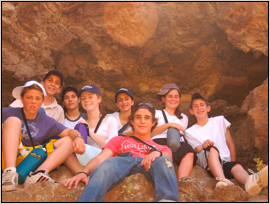 We
all got up at about 6:30, and went to daven, and have breakfast. The first
thing we did, was go and plant pine trees, this was not the most exciting thing,
but i wasn’t hard and was kind of fun. Then we drove for 1/2 an hour to a hike
at Golan Heights. I assumed it wouldn’t be too hard because of our large group.
But i was terribly wrong. We started off going down a large slope, in the heat
and humidity. Then we went up and down, and up and down... Finally we reach
the end where 5 people go swimming, i was not one of them. Everyone was very
hot and tired after the hike. Then we drive somewhere and eat lunch. Finally
we drive to Tzfat and tour around a little bit. We went to a kabalistic art
gallery, who is owned by a friend of the tour guide. We went to the highest
point in Tzfat, and started going down. We davened mincha there and left. Now
were on the bus back to the hotel. Everyone will eat then go to sleep.—Oren We
all got up at about 6:30, and went to daven, and have breakfast. The first
thing we did, was go and plant pine trees, this was not the most exciting thing,
but i wasn’t hard and was kind of fun. Then we drove for 1/2 an hour to a hike
at Golan Heights. I assumed it wouldn’t be too hard because of our large group.
But i was terribly wrong. We started off going down a large slope, in the heat
and humidity. Then we went up and down, and up and down... Finally we reach
the end where 5 people go swimming, i was not one of them. Everyone was very
hot and tired after the hike. Then we drive somewhere and eat lunch. Finally
we drive to Tzfat and tour around a little bit. We went to a kabalistic art
gallery, who is owned by a friend of the tour guide. We went to the highest
point in Tzfat, and started going down. We davened mincha there and left. Now
were on the bus back to the hotel. Everyone will eat then go to sleep.—OrenThursday, June 14  It’s
been an amazing day. The kids and chaperones are totally wiped out but on an
incredible high. As you’ve probably heard in my enthusiasm (and fear that the we
“girls” would over sleep on Thursday morning I sprang out of bed to the thought
that the darn hotel didn’t give me my 6:30 AM wake up call. It wasn’t until I
was showered and someone asked the time (at 5:40) did I realize my mistake! You
can imagine how happy the girls were with me!!! Not too worry, most are speaking
to me again with the promise of an ice cream on me! It’s
been an amazing day. The kids and chaperones are totally wiped out but on an
incredible high. As you’ve probably heard in my enthusiasm (and fear that the we
“girls” would over sleep on Thursday morning I sprang out of bed to the thought
that the darn hotel didn’t give me my 6:30 AM wake up call. It wasn’t until I
was showered and someone asked the time (at 5:40) did I realize my mistake! You
can imagine how happy the girls were with me!!! Not too worry, most are speaking
to me again with the promise of an ice cream on me!
It’s been fantastic watching the dynamic of the class. They are so close and there is a wonderful vibe as a group. It’s been really interesting just watching their bonding as a group and enthusiasm emerge . They all started out sitting in the back of the bus when we arrived at Ben Gurion airport. As of yesterday some of the chaperones were displaced to the back of the bus as the group, as a whole has been moving forward (and actually listening as our tour guide Philip speaks to them!) After visiting Tzipori and then going to Kfat Kedem (where we dressed up in kafias, made the most delicious pita and rode donkeys -yup, even me!) we went on an extraordinary hike down the Arbel. According to our guide- it was “all down hill” although a little challenging. Well... holding on to handrails when there was a very narrow, sheer part of the cliff to climb down-- yes, that was a bit “challenging.” Many of our kids found it to be “a walk in the park”, for others however this really challenged their sense of adventure! I will tell you though- (with the help of their friends and chaperones - they prevailed, overcame their fears [which honestly were significant] and came down glowing. Their friends were SO supportive it was incredible to see. You would all have been proud of all of them. After a stop at Rabbi Akiva and the Ramchal’s kevarim to daven mincha we wrote a note to the people at Kfar Kedem to say thank you and attached it to a homing pigeon!!! After ANOTHER fleisig, chicken shnitzel filled dinner (you can tell I’m happy about that!), while we were on our boat ride in Tiberias we heard from the Kfar Kedem people that the pigeon had delivered our message. Very cool!
Now we are
on to our Yerushalaim portion of the trip. The kids’ excitement is palpable.
More to come!!!!! --hilda Hey Guys!
Hebrew University scans, uploads 1,042-page mahzor dating back to 1331 in Nuremberg JERUSALEM (Press Release)—The valuable and unique Nuremberg Mahzor of 1331 has been scanned and uploaded to the Internet site of the Jewish National and University Library of the Hebrew University of Jerusalem. 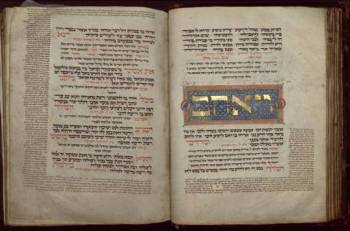 The
Nuremberg Mahzor is a unique treasure from the Middle Ages. The illustrated
manuscript weighs 23 kilograms and encompasses 1,042 pages, each of which is 50
by 37 centimeters in size. The mahzor includes prayers and piyutim (liturgical
poems) for the whole years according to the Ashkenazi tradition, as well as the
five megillot (Biblical scrolls), the haftarot (portions read after the Torah
readings on Sabbaths and holidays) and also a comprehensive collection of
commentaries on the piyutim and prayers which were written in the margins of the
pages. The
Nuremberg Mahzor is a unique treasure from the Middle Ages. The illustrated
manuscript weighs 23 kilograms and encompasses 1,042 pages, each of which is 50
by 37 centimeters in size. The mahzor includes prayers and piyutim (liturgical
poems) for the whole years according to the Ashkenazi tradition, as well as the
five megillot (Biblical scrolls), the haftarot (portions read after the Torah
readings on Sabbaths and holidays) and also a comprehensive collection of
commentaries on the piyutim and prayers which were written in the margins of the
pages. The manuscript was written in Germany in 1331 by a scribe, clearly identified as Matanya, for Yehoshua ben Yitzhak. The commentaries in the margins, however, were written by another scribe, whose name was apparently Yaakov. The manuscript’s nickname derives from the fact that since the expulsion of the Jews from Nuremberg in 1499, it was held in the Nuremberg Municipal Library until 1951. It is the combination and juxtaposition of a number of unusual and sometimes unique aspects that make this manuscript special. It is one of the largest and heaviest codices to have survived anywhere. From an artistic point of view, the ornamentation, painting and decoration in the style of the Upper Rhine valley, are of a very high standard. The mahzor is also unique for its textual content, containing many piyutim not found in any other source. Moreover, the many commentaries have never been researched or published. The mahzor was purchased by the prominent German-Jewish businessman and publisher Zalman Schocken towards the end of his life. Today it belongs to Dr. David and Jemima Jesselson and is kept at the Israel Museum. The uploading of the mahzor to the Internet was made possible thanks to the Jesselsons. The Jewish National and University Library hope that other owners of rare works of Judaica will emulate them and enable the general public to gain access to these works via the internet. The Nuremberg Mahzor is the latest treasure to be added to the JNUL online collection, which, through the David and Fela Shapell Digitization Project, has already made available to the world public such items as original manuscripts, decorative marriage contracts and ethnic musical selections. The Nuremberg Mahzor can be accessed by following the link to this website. The preceding story was provided by Hebrew University.
Epilepsy research ...
When the albumin comes into contact with specific brain cells it interacts
harmfully with them. This leads to a chain of molecular events (changes in the
levels of specific brain proteins) that cause abnormal cell activity. This
abnormal activity often takes the form of an epileptic seizure, and later causes
brain cell degeneration. Epilepsy can occur many years after the trauma, so a
trauma in birth or early childhood might only trigger fits much later in life.
“This signal only normally happens once in the development of the brain, when
the brain is still developing in uteri and in the first few months after birth,"
Friedman says. "We discovered that it happens again after a brain injury. The
brain "feels" something terrible has happened and in some ways goes back into
development mode. It seems as if the brain is trying to cure itself, but for an
adult brain to go back into the same kind of development he experienced as an
embryo is very dangerous. The disadvantages are much greater than the
advantages."
|
 Weiner
first introduced legislation in Congress to cut off funding
for the Palestinian Authority, the West Bank, and Gaza more
than five years ago, citing the misuse of these funds which
embolden terrorism.
Weiner
first introduced legislation in Congress to cut off funding
for the Palestinian Authority, the West Bank, and Gaza more
than five years ago, citing the misuse of these funds which
embolden terrorism. 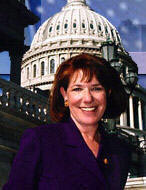 Davis
will replace Rep. Vic Snyder (D-AR) who was chosen to fill the vacancy on the
Oversight and Investigations Subcommittee left by Rep. Marty Meehan (D-MA). Mr.
Meehan is leaving Congress to head the University of Massachusetts.
Davis
will replace Rep. Vic Snyder (D-AR) who was chosen to fill the vacancy on the
Oversight and Investigations Subcommittee left by Rep. Marty Meehan (D-MA). Mr.
Meehan is leaving Congress to head the University of Massachusetts.
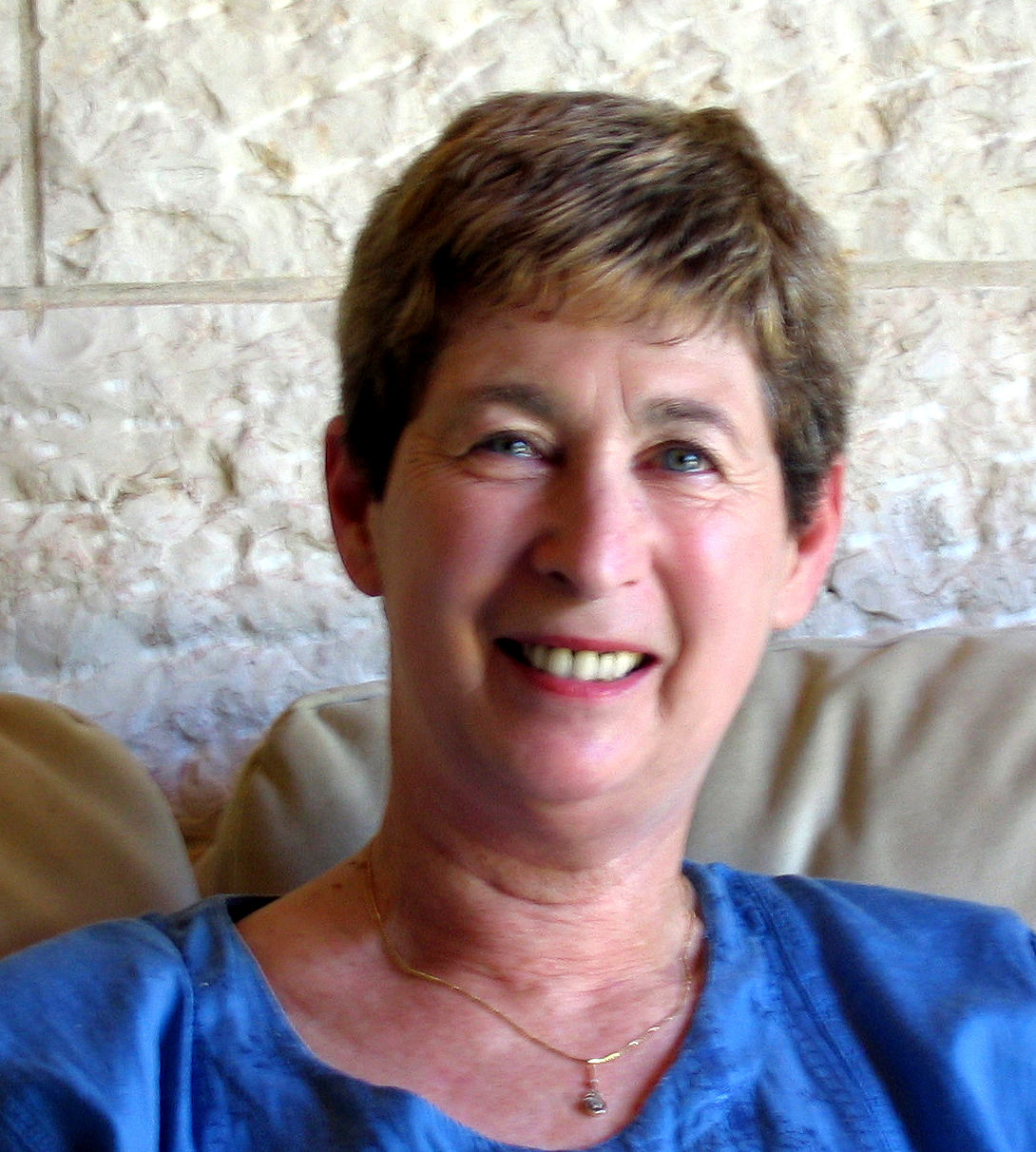

 Your specialist in
Your specialist in
 Jews
in the News
Jews
in the News
 News Sleuths:
News Sleuths: 
 A
SPECIAL CORNER—This juxtaposition of the American flag and the name "Zion" at
that avenue's intersection with Mission Gorge Road is one of editor Don
Harrison's favorite places to drive past in San Diego. Not only does it
symbolize the junction of two great ideals—America and Zionism—but, by chance,
it also is within view of the Kaiser Hospital where both grandsons of Nancy &
Don were born: Shor and Sky Masori. As the hospital is located on
Zion Avenue, Harrison says his grandchildren were born Zionists.
A
SPECIAL CORNER—This juxtaposition of the American flag and the name "Zion" at
that avenue's intersection with Mission Gorge Road is one of editor Don
Harrison's favorite places to drive past in San Diego. Not only does it
symbolize the junction of two great ideals—America and Zionism—but, by chance,
it also is within view of the Kaiser Hospital where both grandsons of Nancy &
Don were born: Shor and Sky Masori. As the hospital is located on
Zion Avenue, Harrison says his grandchildren were born Zionists.
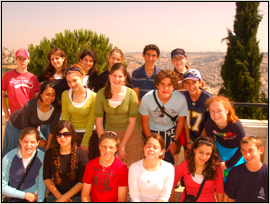 Today
we went to the old city for the first time! The weather was wonderful, and the
Rova was, as usual, filled with jews and non-jews from all walks of life. We
also went through Chizkeyahu’s water tunnels. In the middle Philip made us turn
off our flashlights and walk in the dark! Huddling close together and singing
encouraging songs as we went, we slowly made our way through the blackness. But
there was a light at the end of the tunnel! We came out of the other end and
walked (or should I say shlepped?) our way up an unbeleivably high hill. You
heard that Jesus walked on water? Well I walked up a wall!!! After that we
toured the old city, and split up for lunch. Yes Dad, I did go to Bonkers, I
also bought a lot of candy in case Daniel is reading this. After that we went on
a scavenger hunt, which my team naturally won. Then we went back to the hotel
where I found Avigail waiting for me, cute as ever. Now it’s almost shabbos, and
I have to go. I love you guys so much, and I miss you! Love, —Leah
Today
we went to the old city for the first time! The weather was wonderful, and the
Rova was, as usual, filled with jews and non-jews from all walks of life. We
also went through Chizkeyahu’s water tunnels. In the middle Philip made us turn
off our flashlights and walk in the dark! Huddling close together and singing
encouraging songs as we went, we slowly made our way through the blackness. But
there was a light at the end of the tunnel! We came out of the other end and
walked (or should I say shlepped?) our way up an unbeleivably high hill. You
heard that Jesus walked on water? Well I walked up a wall!!! After that we
toured the old city, and split up for lunch. Yes Dad, I did go to Bonkers, I
also bought a lot of candy in case Daniel is reading this. After that we went on
a scavenger hunt, which my team naturally won. Then we went back to the hotel
where I found Avigail waiting for me, cute as ever. Now it’s almost shabbos, and
I have to go. I love you guys so much, and I miss you! Love, —Leah